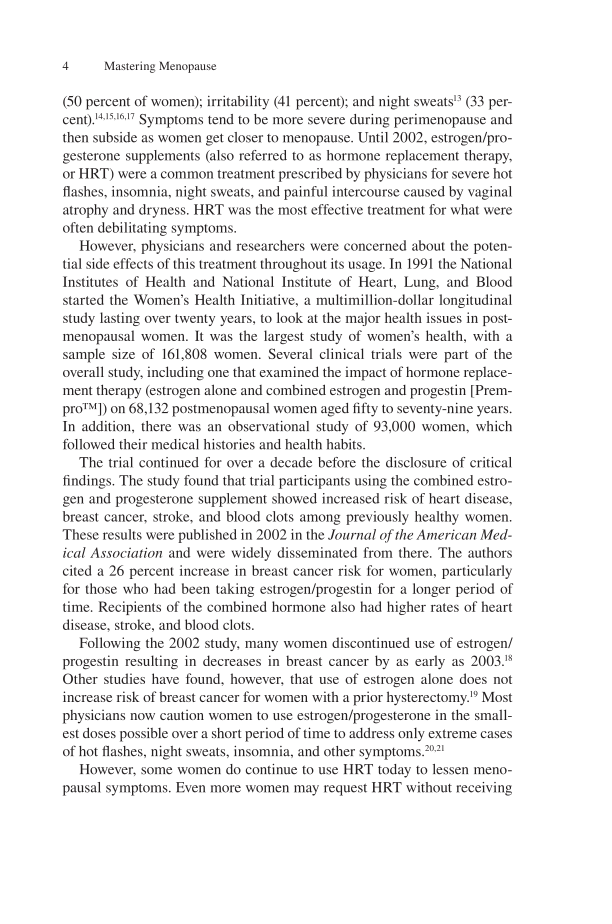4 Mastering Menopause (50 percent of women) irritability (41 percent) and night sweats13 (33 per- cent).14,15,16,17 Symptoms tend to be more severe during perimenopause and then subside as women get closer to menopause. Until 2002, estrogen/pro- gesterone supplements (also referred to as hormone replacement therapy, or HRT) were a common treatment prescribed by physicians for severe hot flashes, insomnia, night sweats, and painful intercourse caused by vaginal atrophy and dryness. HRT was the most effective treatment for what were often debilitating symptoms. However, physicians and researchers were concerned about the poten- tial side effects of this treatment throughout its usage. In 1991 the National Institutes of Health and National Institute of Heart, Lung, and Blood started the Women’s Health Initiative, a multimillion-dollar longitudinal study lasting over twenty years, to look at the major health issues in post- menopausal women. It was the largest study of women’s health, with a sample size of 161,808 women. Several clinical trials were part of the overall study, including one that examined the impact of hormone replace- ment therapy (estrogen alone and combined estrogen and progestin [Prem- pro™]) on 68,132 postmenopausal women aged fifty to seventy-nine years. In addition, there was an observational study of 93,000 women, which followed their medical histories and health habits. The trial continued for over a decade before the disclosure of critical findings. The study found that trial participants using the combined estro- gen and progesterone supplement showed increased risk of heart disease, breast cancer, stroke, and blood clots among previously healthy women. These results were published in 2002 in the Journal of the American Med- ical Association and were widely disseminated from there. The authors cited a 26 percent increase in breast cancer risk for women, particularly for those who had been taking estrogen/progestin for a longer period of time. Recipients of the combined hormone also had higher rates of heart disease, stroke, and blood clots. Following the 2002 study, many women discontinued use of estrogen/ progestin resulting in decreases in breast cancer by as early as 2003.18 Other studies have found, however, that use of estrogen alone does not increase risk of breast cancer for women with a prior hysterectomy.19 Most physicians now caution women to use estrogen/progesterone in the small- est doses possible over a short period of time to address only extreme cases of hot flashes, night sweats, insomnia, and other symptoms.20,21 However, some women do continue to use HRT today to lessen meno- pausal symptoms. Even more women may request HRT without receiving
Document Details My Account Print multiple pages
Print
You have printed 0 times in the last 24 hours.
Your print count will reset on at .
You may print 0 more time(s) before then.
You may print a maximum of 0 pages at a time.
















































































































































































































